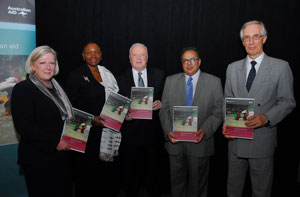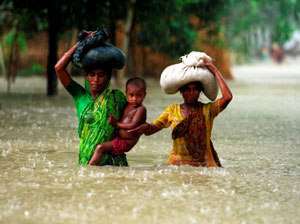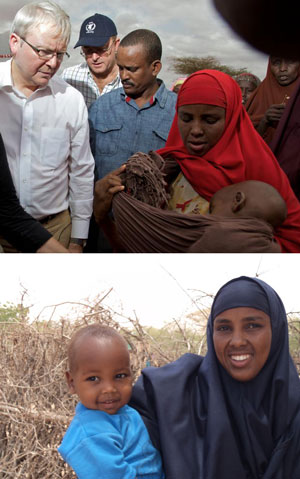Australia launched its new Humanitarian Action Policy at the United Nations in New York on 16 December 2011. The Policy will guide Australia's humanitarian assistance and supports the fundamental purpose of Australia's aid program–to help overcome poverty.
Read the Humanitarian Action Policy
Humanitarian action can mean the difference between life and death for many thousands of people each year. It helps people prepare for, respond to and recover from crises, so that they can get back to leading productive lives more quickly.
Natural disasters are increasing in frequency, scale and impact. Conflict may also intensify in the coming decades as the world's population continues to rise and the demand for limited natural resources continues to grow.
Crises, caused by natural hazards or humans can inflict terrible suffering and hardship. Humanitarian crises displace millions, kill thousands of people each year and keep many more living in poverty.
Humanitarian action helps to protect and rebuild development gains by providing access to life-saving help such as medicine, food assistance, education and health services.
When the floods devastated Pakistan in July 2010 they affected a staggering 20 million people. More than 1.7 million homes, 8,000 schools and 24,000kms of road were damaged or destroyed. Two million hectares of planted crops were washed away and millions of livestock were lost.
The earthquake which struck Haiti in January 2010 killed 220,000 people and made more than 1.5 million people homeless. Before the earthquake, 70 per cent of Haitians were living on less than US$2 a day and health and education indicators were among the poorest in the western hemisphere.
Australia did its part in response to both these crises. Australia was one of the first countries to respond to the Pakistan floods, providing $75 million in humanitarian and early recovery assistance. The Australian joint civilian and military medical team that deployed to Kot Addu, Sindh Province, treated over 11,000 patients in 10 weeks. In Haiti, Australia provided $15 million dollars in immediate emergency response and early recovery assistance, helping more than 3.5 million people access food, clean water, health care and shelter.
If governments around the world, together with the United Nations and other international organisations, had not mounted large scale responses to these disasters in Pakistan and in Haiti, many more people would have lost their lives from poor nutrition, inadequate health care, lack of shelter and access to water and sanitation.
More information
2011 Humanitarian action policy
Disaster risk reduction, humanitarian aid and mine action
2009 Disaster risk reduction policy
2010-2014 Mine Action Strategy



